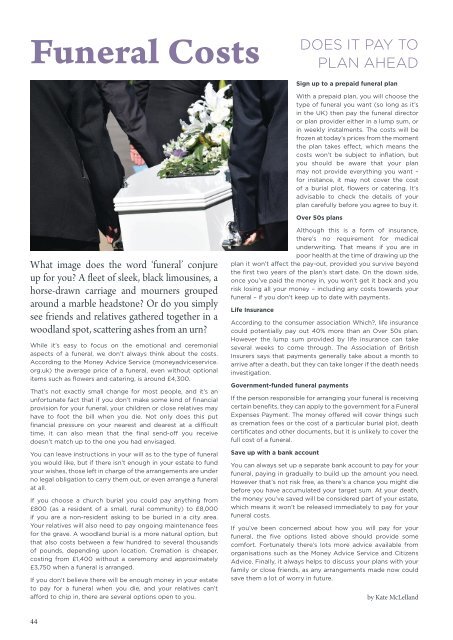I and A Mag Jan20
Telford Magazine
Telford Magazine
Create successful ePaper yourself
Turn your PDF publications into a flip-book with our unique Google optimized e-Paper software.
Funeral Costs<br />
DOES IT PAY TO<br />
PLAN AHEAD<br />
Sign up to a prepaid funeral plan<br />
With a prepaid plan, you will choose the<br />
type of funeral you want (so long as it’s<br />
in the UK) then pay the funeral director<br />
or plan provider either in a lump sum, or<br />
in weekly instalments. The costs will be<br />
frozen at today’s prices from the moment<br />
the plan takes effect, which means the<br />
costs won’t be subject to inflation, but<br />
you should be aware that your plan<br />
may not provide everything you want –<br />
for instance, it may not cover the cost<br />
of a burial plot, flowers or catering. It’s<br />
advisable to check the details of your<br />
plan carefully before you agree to buy it.<br />
Over 50s plans<br />
What image does the word ‘funeral’ conjure<br />
up for you? A fleet of sleek, black limousines, a<br />
horse-drawn carriage <strong>and</strong> mourners grouped<br />
around a marble headstone? Or do you simply<br />
see friends <strong>and</strong> relatives gathered together in a<br />
woodl<strong>and</strong> spot, scattering ashes from an urn?<br />
While it’s easy to focus on the emotional <strong>and</strong> ceremonial<br />
aspects of a funeral, we don’t always think about the costs.<br />
According to the Money Advice Service (moneyadviceservice.<br />
org.uk) the average price of a funeral, even without optional<br />
items such as flowers <strong>and</strong> catering, is around £4,300.<br />
That’s not exactly small change for most people, <strong>and</strong> it’s an<br />
unfortunate fact that if you don’t make some kind of financial<br />
provision for your funeral, your children or close relatives may<br />
have to foot the bill when you die. Not only does this put<br />
financial pressure on your nearest <strong>and</strong> dearest at a difficult<br />
time, it can also mean that the final send-off you receive<br />
doesn’t match up to the one you had envisaged.<br />
You can leave instructions in your will as to the type of funeral<br />
you would like, but if there isn’t enough in your estate to fund<br />
your wishes, those left in charge of the arrangements are under<br />
no legal obligation to carry them out, or even arrange a funeral<br />
at all.<br />
If you choose a church burial you could pay anything from<br />
£800 (as a resident of a small, rural community) to £8,000<br />
if you are a non-resident asking to be buried in a city area.<br />
Your relatives will also need to pay ongoing maintenance fees<br />
for the grave. A woodl<strong>and</strong> burial is a more natural option, but<br />
that also costs between a few hundred to several thous<strong>and</strong>s<br />
of pounds, depending upon location. Cremation is cheaper,<br />
costing from £1,400 without a ceremony <strong>and</strong> approximately<br />
£3,750 when a funeral is arranged.<br />
If you don’t believe there will be enough money in your estate<br />
to pay for a funeral when you die, <strong>and</strong> your relatives can’t<br />
afford to chip in, there are several options open to you.<br />
Although this is a form of insurance,<br />
there’s no requirement for medical<br />
underwriting. That means if you are in<br />
poor health at the time of drawing up the<br />
plan it won’t affect the pay-out, provided you survive beyond<br />
the first two years of the plan’s start date. On the down side,<br />
once you’ve paid the money in, you won’t get it back <strong>and</strong> you<br />
risk losing all your money – including any costs towards your<br />
funeral – if you don’t keep up to date with payments.<br />
Life Insurance<br />
According to the consumer association Which?, life insurance<br />
could potentially pay out 40% more than an Over 50s plan.<br />
However the lump sum provided by life insurance can take<br />
several weeks to come through. The Association of British<br />
Insurers says that payments generally take about a month to<br />
arrive after a death, but they can take longer if the death needs<br />
investigation.<br />
Government-funded funeral payments<br />
If the person responsible for arranging your funeral is receiving<br />
certain benefits, they can apply to the government for a Funeral<br />
Expenses Payment. The money offered will cover things such<br />
as cremation fees or the cost of a particular burial plot, death<br />
certificates <strong>and</strong> other documents, but it is unlikely to cover the<br />
full cost of a funeral.<br />
Save up with a bank account<br />
You can always set up a separate bank account to pay for your<br />
funeral, paying in gradually to build up the amount you need.<br />
However that’s not risk free, as there’s a chance you might die<br />
before you have accumulated your target sum. At your death,<br />
the money you’ve saved will be considered part of your estate,<br />
which means it won’t be released immediately to pay for your<br />
funeral costs.<br />
If you’ve been concerned about how you will pay for your<br />
funeral, the five options listed above should provide some<br />
comfort. Fortunately there’s lots more advice available from<br />
organisations such as the Money Advice Service <strong>and</strong> Citizens<br />
Advice. Finally, it always helps to discuss your plans with your<br />
family or close friends, as any arrangements made now could<br />
save them a lot of worry in future.<br />
by Kate McLell<strong>and</strong><br />
44










